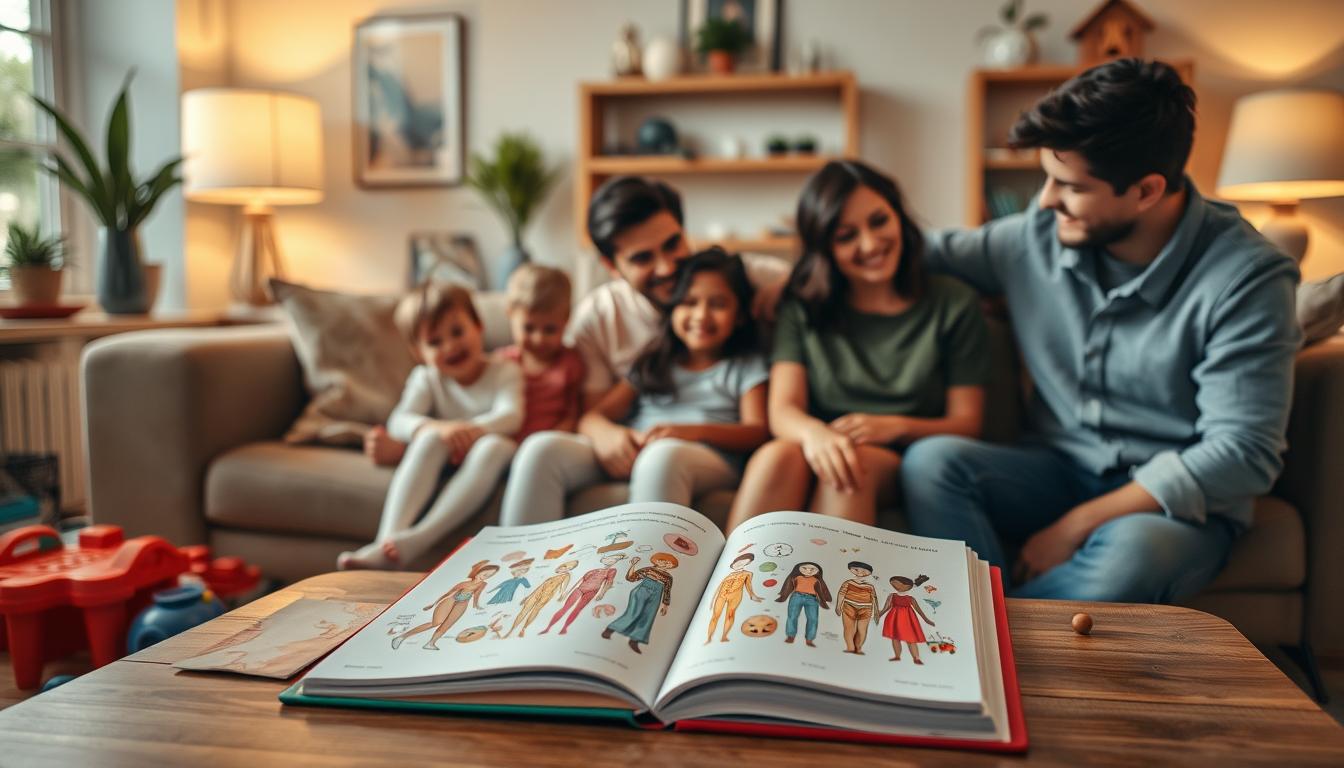Ever hesitated about talking to your kids about sex? It’s a big challenge for many parents. But avoiding the talk can cause big misunderstandings. The key is to create a safe and open space for these conversations.
Dr. Corinne Masur says being direct and honest can help. Even young kids can learn about their bodies and privacy without feeling awkward. As kids get older, they can understand more about growing up and how babies are made.
Using books like “The Care and Keeping of You” by American Girl or Rutgers University’s guides can help a lot. It’s important to talk in a way that fits your child’s age. Keep having these talks as your child grows to build a positive view of sex and relationships.
Key Takeaways
- Most discomfort in discussing sex with children comes from opposite-sex parents.
- Parents often feel ill-prepared due to their own lack of open sex talks during childhood.
- Preschool children are ready to learn about body parts and privacy without making it taboo.
- Honesty in discussions increases the likelihood of children choosing parents as trusted sources.
- Utilize books and resources like those from Rutgers University to guide conversations.
Understanding the Importance of Early Conversations
Starting early conversations with your kids is key to their healthy growth. It helps them feel good about their bodies and personal growth. Many parents struggle with these talks, but ignoring them can harm their kids.
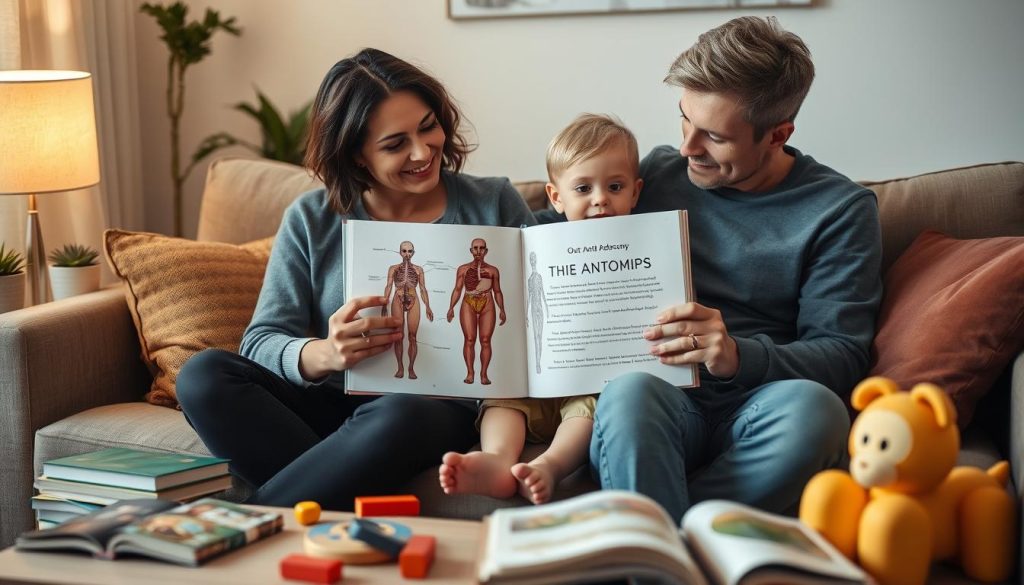
Why Avoiding the Topic is Harmful
Parents who don’t talk about puberty and growth early might miss the mark. Kids might then find info from places that aren’t trustworthy. This can lead to wrong ideas and feelings of shame. Talking openly helps avoid these problems and builds a positive view of their bodies.
When to Start the Conversation
It’s important to start these talks early. Kids start asking about their bodies by age two or three. Waiting too long can lead them to seek out bad info. Early childhood development experts say talking early helps kids grow up with good communication skills.
Benefits of Age-Appropriate Discussions
Talking about puberty and body image in a way that fits their age has many benefits. It helps kids understand and feel good about themselves. It also prepares them to face future challenges with confidence.
Strategies for Building a Comfortable Environment
Creating a safe space for talking about sex with your kids is key. It helps build a healthy family. Open communication, non-judgmental parenting, and sex-positive education are important. They make sure your child feels supported and informed. Here are some ways to make this environment.
Reflecting on Your Own Comfort Level
Start by thinking about how you feel about talking about sex. Many parents are uncomfortable, but it’s okay to admit it. Online family therapy can help you feel more confident. Your comfort will make talking to your child easier.
Creating an Open and Judgement-Free Space
Make sure your family feels free to ask about sex. Talk about how important it is to listen without judging. This builds trust and lets your child share their thoughts openly. Studies show kids from happy homes are less likely to struggle with mental health issues.
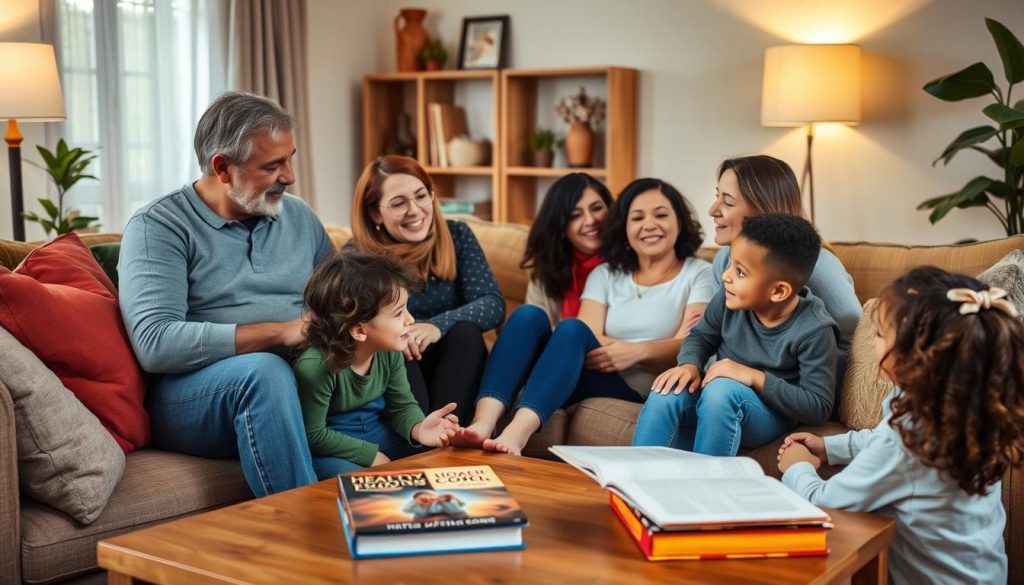
Utilizing Books and Resources
Books and resources can help explain complex topics like sex. They give your kids the facts they need. Using these tools makes you feel more ready to talk about it. Online family therapy also offers support for you and your child.
By using these strategies, you build a supportive family environment. This helps your child understand sex better and strengthens your family bond.
Adjusting Your Approach Based on Age
Teaching kids about sex needs to fit their age. Each age group needs different levels of detail. This makes sure they understand and can relate to the information.
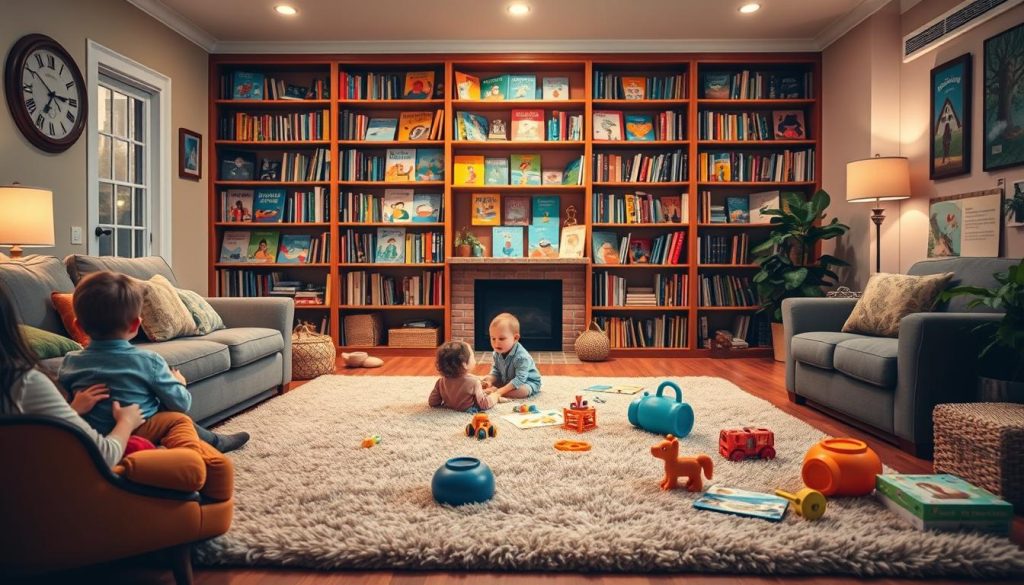
Talking to Young Children
When kids are young, keep it simple. For example, kids aged 2 to 5 are learning to be independent. Answer their questions clearly and honestly.
Use the right words for body parts and talk about their questions. Teach them about their body and personal space early on.
Conversations with Tweens and Teens
As kids get older, they can handle more complex topics. Talk about puberty and feelings in a detailed way. This helps them understand their bodies and emotions.
Open talks about these topics help them accept themselves. Teach them about respecting their own and others’ space.
Introducing the Concept of Consent
Start teaching consent in early teens. Explain consent and respect in the teenage years. This stage is about understanding rights and responsibilities.
Teach them about mutual respect and clear boundaries. This helps them respect themselves and others.
Changing how you talk to kids based on their age makes learning easier. It helps them grow up to be confident and respectful.
Addressing Common Parenting Challenges in Sex Discussions
Talking about sex can be tough for parents, especially with stepkids, divorce, and remarriage. Dealing with sibling rivalry and LGBTQ+ kids adds to the mix. It’s important to approach these topics with care and knowledge.
Many parents struggle because of their own upbringing. They might not have talked about sex much when they were young. Getting help from a sex educator can be very helpful. These experts know a lot about sex, not just the biology.
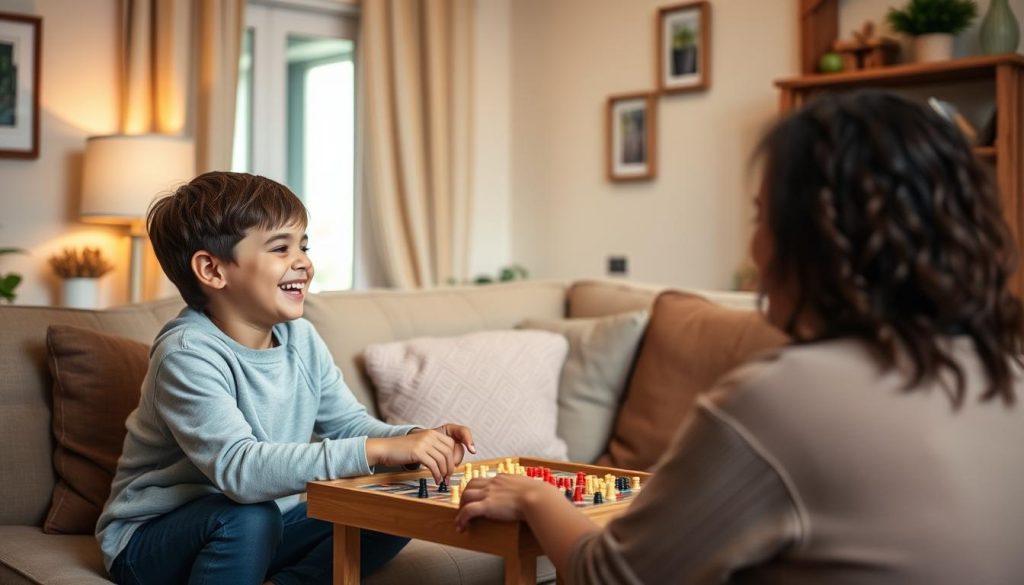
Finding the right time to talk about sex is another hurdle. Studies show that starting early and talking often helps. A study with 23 U.S. parents found that this approach builds trust and openness.
It’s also key to make sure all kids feel included. Learning about different family types helps parents be more welcoming. Sex educators can offer tools and language to help with this.
Dealing with sibling rivalry can also be tough. Using open and honest communication can help. Sex education programs can provide a safe space to discuss these topics. Parents who attend these programs feel more confident and ready to answer tough questions.
Remember, you’re not alone in facing these challenges. Getting help from educators and community resources can make a big difference. It helps you have important and meaningful talks with your child.
Conclusion
Talking about sex with your kids is not just one conversation. It’s an ongoing talk that grows with them. Building a strong family bond is key. This bond makes your kids feel safe to ask and get honest answers.
Studies show parents are crucial in many areas. For example, some programs help urban students succeed (Jeynes, 2012). The Nutrition Detectives™ program teaches kids and parents about healthy eating (Katz et al., 2011). These examples show how important parents are in their child’s life.
Positive parenting, like being warm and supportive, helps kids manage their feelings better. It also reduces aggression and impulsiveness. Research shows that when both parents are involved, kids do better (Panter-Brick et al., 2014; Rosenberg & Wilcox, 2006).
Creating a family that values open talk helps kids in many ways. It’s not just about sex. It’s about helping them grow into healthy, well-informed adults. Keep learning and adjusting your approach as your child grows. The goal is to give them a strong foundation of knowledge and trust.
Resources to Further Your Understanding and Approach
Parents can find many resources to learn more about sex and parenting. Books like “It’s Perfectly Normal” by Robie H. Harris are great for kids. They explain puberty and sexuality in a way kids can understand.
Online sites like the Triple P Positive Parenting Program offer helpful tips. They focus on building strong relationships between parents and kids. This includes talking well, setting routines, and encouraging good behavior.
Getting help from others is also key. For example, if your child has eating disorders or anxiety, talking to a doctor or therapist is a good idea. Learning about social media safety, postpartum health, and eco-friendly parenting is also important.
More than 60% of these resources deal with mental health and parenting. About 40% talk about how current events affect families. Meanwhile, 30% focus on teaching kids to be empathetic, and 20% on helping them face challenges.
Books on positive parenting are filled with useful advice. They’re based on science and are popular among parents. Online programs, podcasts, and videos also offer great tips from experts. They’re perfect for busy parents who need quick advice.
FAQ
How can I create an open and judgment-free space for discussing sex with my child?
When should I start talking to my child about sex?
What are the benefits of age-appropriate discussions about sex?
Why is avoiding discussions about sex harmful to my child?
How do I reflect on my comfort level before discussing sex with my child?
What strategies can I use to make conversations about sex more comfortable?
How can I introduce the concept of consent to my child?
What are common challenges parents face when talking about sex with their children?
How can I adjust my approach to discussing sex based on my child’s age?
What resources are available to help me discuss sex and related topics with my child?
How can I support my child if they have anxiety about discussing sex?
Why is it important to integrate discussions of social media safety in sex education?
This post contains affiliate links. If you click on a link and make a purchase, I may earn a small commission — at no extra cost to you. Thank you for supporting this blog and helping me keep the patterns free! Read the full Affiliate Disclosure & Transparency.
